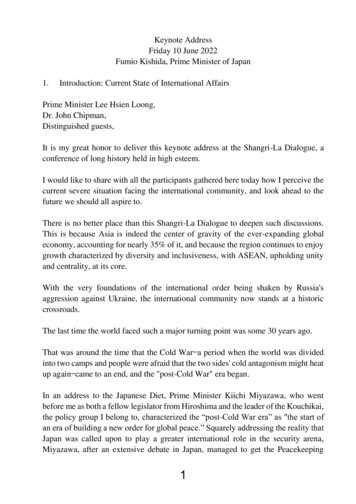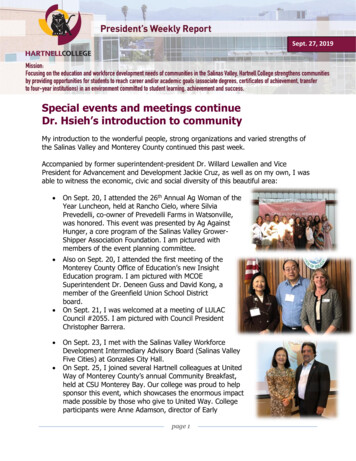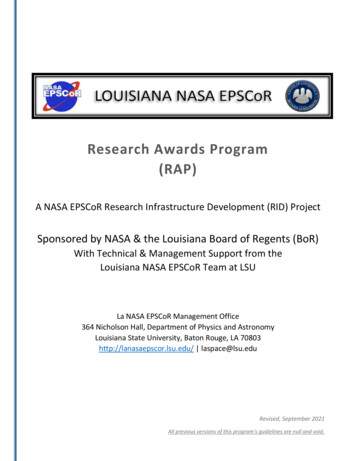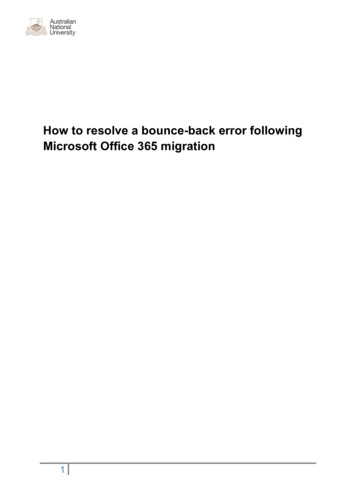
Transcription
Keynote AddressFriday 10 June 2022Fumio Kishida, Prime Minister of Japan1.Introduction: Current State of International AffairsPrime Minister Lee Hsien Loong,Dr. John Chipman,Distinguished guests,It is my great honor to deliver this keynote address at the Shangri-La Dialogue, aconference of long history held in high esteem.I would like to share with all the participants gathered here today how I perceive thecurrent severe situation facing the international community, and look ahead to thefuture we should all aspire to.There is no better place than this Shangri-La Dialogue to deepen such discussions.This is because Asia is indeed the center of gravity of the ever-expanding globaleconomy, accounting for nearly 35% of it, and because the region continues to enjoygrowth characterized by diversity and inclusiveness, with ASEAN, upholding unityand centrality, at its core.With the very foundations of the international order being shaken by Russia'saggression against Ukraine, the international community now stands at a historiccrossroads.The last time the world faced such a major turning point was some 30 years ago.That was around the time that the Cold War—a period when the world was dividedinto two camps and people were afraid that the two sides' cold antagonism might heatup again—came to an end, and the "post-Cold War" era began.In an address to the Japanese Diet, Prime Minister Kiichi Miyazawa, who wentbefore me as both a fellow legislator from Hiroshima and the leader of the Kouchikai,the policy group I belong to, characterized the “post-Cold War era” as "the start ofan era of building a new order for global peace.” Squarely addressing the reality thatJapan was called upon to play a greater international role in the security arena,Miyazawa, after an extensive debate in Japan, managed to get the Peacekeeping1
Operations Cooperation Act passed, and he deployed Japan's Self-Defense Forces toCambodia based on this Act.With some 30 years having passed since Miyazawa's time, in what kind of era arewe now living?Since the pandemic broke out, the world has become even more uncertain. Amidstcontinuing economic disruption, we have come to recognize the importance ofreliable and secure supply chains.Then, as the world was still recovering from the pandemic, Russia’s aggressionagainst Ukraine occurred. No country or region in the world can shrug this off as“someone else’s problem." It is a situation that shakes the very foundations of theinternational order, which every country and individual gathered here today shouldregard as their own affair.In the South China Sea, are the rules really being honored? Neither international law,in particular the United Nations Convention on the Law of the Sea (UNCLOS), towhich all relevant countries agreed after years of dialogue and efforts, nor the awardrendered by the Arbitral Tribunal under this convention, is being complied with.In the East China Sea, where Japan is located, unilateral attempts to change the statusquo by force in violation of international law are continuing. Japan is taking a firmstand against such attempts.Peace and stability across the Taiwan Strait, which is located between these two seas,is also of extreme importance.Unfortunately, much of activities not respecting people's diversity, free will, andhuman rights is also taking place in this region.Furthermore, since the beginning of this year, North Korea has repeatedly launchedballistic missiles, including a new type of ICBM, with unprecedented frequency andin new ways. As such, North Korea is strengthening its nuclear and missile activitiesin violation of UN Security Council resolutions, posing a clear and serious challengeto the international community. It is deeply regrettable that the recently proposedSecurity Council resolution was not adopted as a result of the exercise of the veto.The abductions issue, which is a top priority for my administration, is also a seriousviolation of human rights.2
At the root of all these problems is a situation in which confidence in the universalrules that govern international relations is being shaken. This is the essential andmost serious underlying problem.Can the rules-based international order we have built through hard work, dialogue,and consensus be upheld and the march of peace and prosperity continue? Or willwe return to a lawless world where rules are ignored and broken, where unilateralchanges to the status quo by force are unchallenged and accepted, and where thestrong coerce the weak militarily or economically?That is the choice we have to make today.2.Japan's Responsibility and EffortsJapan is the world's third largest economy and has consistently sought to bring aboutpeace and prosperity in the region since the end of the Second World War, makingcontributions mainly in the economic field. Accordingly, the responsibility Japanmust fulfill is heavy.With that understanding, what role should Japan play in realizing peace andprosperity, as we face this crossroads in history?While focusing on universal values that everyone should respect and defend, we mustfirmly hold aloft the banner of our ideals for the future, such as a world withoutnuclear weapons, while also responding astutely and decisively as the situationdemands. I am committed to "realism diplomacy for a new era” that adheres to thiskind of thorough pragmatism.In the midst of all this, Japan will not lose its humility, flexibility in valuing diversity,or tolerance that respects the individuality of others. However, we will be moreproactive than ever in tackling the challenges and crises that face Japan, Asia, andthe world.Taking that perspective, in order to maintain and strengthen the peaceful order in thisregion, I will advance the “Kishida Vision for Peace” and boost Japan's diplomaticand security role in the region by promoting the following five pillars of initiatives.The first is maintaining and strengthening the rules-based free and open internationalorder; in particular, we will press forward in bringing new developments towards aFree and Open Indo-Pacific.3
The second is enhancing security. We will advance the fundamental reinforcementof Japan's defense capabilities in tandem with reinforcing the Japan-U.S. Allianceand strengthening our security cooperation with other like-minded countries.The third is promoting realistic efforts to bring about a world without nuclearweapons.The fourth is strengthening the functions of the United Nations, including UNSecurity Council reform.The fifth is strengthening international cooperation in new policy areas such aseconomic security.2-1 Maintaining and Strengthening the Rules-based Free and Open InternationalOrder; Bringing New Developments towards a Free and Open Indo-Pacific(1) Maintaining and Strengthening the Rules-based Free and Open InternationalOrderIn order to bring peace to the international community, it is imperative that we firstpress forward in maintaining and strengthening the rules-based free and openinternational order.The rule of law serves as the foundation supporting this kind of international order.Alongside it are the peaceful resolution of disputes, the non-use of force, and respectfor sovereignty.On the sea, it is freedom of navigation, and in the economy, free trade.Needless to say, respect for human rights is also critical, as is a democratic politicalsystem that reflects people's free will and diversity.These are common and universal principles developed by all people worldwide, who,longing for world peace, have amassed collective wisdom. It goes without sayingthat the rules and principles I have just mentioned are also consistent with thepurposes and principles of the UN Charter.Rules must be respected. Even if they become inconvenient, one cannot be allowedto act as if they did not exist, nor can one be allowed to unilaterally change them. Ifone wants to change them, a new consensus must be made.4
(2) Bringing New Developments towards a Free and Open Indo-PacificJapan has been promoting a Free and Open Indo-Pacific with a view to maintainingand strengthening the rules-based free and open international order in this region,and the vision we have advocated has come to gain broad support in the internationalcommunity.Japan has consistently and vigorously supported the "ASEAN Outlook on the IndoPacific" (AOIP), which ASEAN has developed as its own basic policy.Looking around the world, a variety of actors, including the United States, Australia,India, the United Kingdom, France, Germany, Italy, the Netherlands, and theEuropean Union, have all laid out visions for the Indo-Pacific.Sharing a common grand vision, like-minded partners are each taking action on theirown initiative, not at the behest of others. This is the very concept of a Free and OpenIndo-Pacific, which is based on inclusiveness.In particular, here in the Indo-Pacific region, collaboration with ASEAN isabsolutely essential.After assuming the post of prime minister, I first visited Cambodia, which holds thisyear's ASEAN Chairmanship. Later, I visited Indonesia, Vietnam, and Thailand, andtoday, I am here in Singapore. I have also held meetings with the leaders of ASEANcountries.The history of Japan and Southeast Asia is underpinned by a long history of goodwilland friendship. After the war, Japan supported the development of Southeast Asia,and Southeast Asian countries extended a helping hand to Japan in its recovery fromthe unprecedented earthquake and tsunami disaster.I would like to continue to work hand-in-hand with the leaders of ASEAN countriesto deepen discussions on ways to ensure peace and prosperity in the region.Along with ASEAN countries, Pacific Island Countries are also important partnersfor the realization of a Free and Open Indo-Pacific. We will contribute tostrengthening the foundation for their sustainable and resilient economicdevelopment, including addressing the existential challenge of climate change. Wehave provided timely assistance in response to recent changes in the securityenvironment, such as laying an undersea cable in east Micronesia in partnership with5
Australia and the U.S., and we will work together with our Pacific Island partners toensure a rules-based sustainable maritime order.Cooperation based on a Free and Open Indo-Pacific is cooperation built upon longstanding trust. It is not limited to hardware, such as infrastructure construction, butinstead also focuses on supporting the development of local human resources,promoting autonomous and inclusive development, and fostering industry throughpublic and private initiatives as potential investment partners. We have alsosupported efforts to strengthen ASEAN's connectivity.It is also necessary for like-minded countries to work together to increase theinvestment of resources in this region.In addition to the ASEAN and Pacific Island Countries that I mentioned earlier, Japan,Australia, India, and the U.S., also known as the Quad, is playing an important rolein promoting a Free and Open Indo-Pacific. At the recent Quad Leaders’ Meeting inTokyo, we confirmed that the Quad will seek to extend more than US 50 billion offurther infrastructure assistance and investment in the Indo-Pacific over the next fiveyears, which will be essential in promoting productivity and prosperity in this region.I will further accelerate these efforts. We intend to enhance existing Free and OpenIndo-Pacific cooperation by beefing up our diplomatic efforts including byexpanding our Official Development Assistance (ODA), while engaging in anoptimized, efficient, and strategic use of international cooperation through ODA. Iwill lay out a "Free and Open Indo-Pacific Plan for Peace" by next spring, which willstrengthen Japan's efforts to further promote the vision of a Free and Open IndoPacific, with an emphasis on providing patrol vessels and enhancing maritime lawenforcement capabilities, as well as cyber security, digital and green initiatives, andeconomic security.In recent years, Japan has particularly been strengthening its maritime security effortswhile utilizing advanced technologies such as satellites, artificial intelligence, andunmanned aerial vehicles, and will continue to share its knowledge and experiencewith other countries. From this perspective, over the next three years, we will makeuse of technical cooperation, training, and other means conducive to strengtheningthe maritime law enforcement capabilities of at least 20 countries to promote effortsto train at least 800 maritime security personnel and strengthen their human resourcesnetworks. In addition, we will provide at least approximately US 2 billion inassistance, such as the provision of maritime security equipment including patrolvessels and development of maritime transportation infrastructure, to Indo-Pacificcountries over the next three years. We will strengthen our support to Indo-Pacific6
countries, utilizing cooperation of Quad and frameworks of internationalorganizations.In addition, in order to maintain and strengthen the international order based on rulesand universal values such as the rule of law, we will strengthen connections andnetworks among countries and peoples. To this end, we will train more than 1,500personnel in the fields of the rule of law and governance over the next three years.2-2. Expanding Japan's Security Role(1) Fundamentally Reinforcing Japan's Own Defense CapabilitiesSecond, I would like to talk about the role Japan should play in the realm of security.In light of Russia’s aggression against Ukraine, countries’ perceptions on securityhave drastically changed around the world. Germany has announced that it will shiftits security policy and raise its defense budget to 2% of its GDP. Finland and Sweden,Russia's neighbors, have changed their historical policy of neutrality and announcedthey have applied for NATO membership.I myself have a strong sense of urgency that “Ukraine today may be East Asiatomorrow.” Japan has also made the decision to shift its policy towards Russia andis united with the international community in efforts to impose strong sanctionsagainst Russia and support Ukraine. As prime minister of the peace-loving nationJapan, I have a responsibility to protect the lives and assets of the Japanese peopleand to contribute to a peaceful order in the region.I will seek to build a stable international order through dialogue, not confrontation.At the same time, however, we must be prepared for the emergence of an entity thattramples on the peace and security of other countries by force or threat withouthonoring the rules.As a means of preventing such situations and protecting ourselves, we need toenhance our deterrence and response capabilities. This will be absolutely essential ifJapan is to learn to survive in the new era and keep speaking out as a standard-bearerof peace.As the security environment surrounding Japan becomes increasingly severe, we willset out a new National Security Strategy by the end of this year. I am determined to7
fundamentally reinforce Japan's defense capabilities within the next five years andsecure substantial increase of Japan’s defense budget needed to effect it.In doing so, we will not rule out any options, including so-called "counterstrikecapabilities," and will realistically consider what is necessary to protect the lives andlivelihoods of our people.To all of you, I stress that Japan's posture as a peace-loving nation will remainunchanged. Our efforts will proceed within the scope of our Constitution and incompliance with international law, in a manner that does not alter the basic roles andmissions shared between Japan and the U.S. under our alliance. We will continue toexplain our approach to other countries in a transparent and thorough manner.(2) The Japan-U.S. Alliance and Security Cooperation with Like-minded CountriesNo country can ensure its security entirely on its own. That is why I will promotemultilayered security cooperation with like-minded countries that share universalvalues, positioning the Japan-U.S. Alliance as the linchpin.In my meeting with U.S. President Biden during his recent visit to Japan, he stronglysupported my determination regarding Japan's defense capabilities. We were also infull agreement on expanding and deepening Japan-U.S. security and defensecooperation.We will further reinforce the deterrence and response capabilities of the Japan-U.S.Alliance, which has become the cornerstone of peace and stability in not only theIndo-Pacific, but also the entire world.At the same time, we will actively promote security cooperation with Australia andother like-minded countries.Prime Minister Lee Hsien Loong, I am very pleased to begin negotiations withSingapore to conclude a defense equipment and technology transfer agreement. Wewill continue to promote our efforts to conclude defense equipment and technologytransfer agreements with ASEAN countries and materialize specific cooperationprojects according to their needs.Regarding Reciprocal Access Agreements, following the signing of an agreementwith Australia in January, we have recently reached an agreement in principle with8
the United Kingdom. Japan will work closely with like-minded partners in Europeand Asia towards the conclusion of these agreements.In addition, in order to contribute to the realization of a free and open maritime order,Japan will dispatch a Maritime Self-Defense Force unit led by the destroyer Izumoto the Indo-Pacific region from June 13 and conduct joint exercises with countries inthe region including Southeast Asia and the Pacific.2-3. Promoting Realistic Efforts towards a World without Nuclear WeaponsThird, we will do our utmost towards achieving a world without nuclear weapons.Amid the crisis in Ukraine, the use of nuclear weapons by Russia is being discussedas a real possibility. We must not repeat the scourge of nuclear weapons. The threatof nuclear weapons, let alone the use of them, should never be tolerated. As the primeminister of the only country that has suffered the devastation of atomic bombings, Istrongly appeal for this.The ramifications of Russia’s threat to use nuclear weapons are not limited to thethreat itself. The threat may have already caused serious damage to the nuclearnonproliferation regime. It may have already made it even more difficult forcountries seeking to develop nuclear weapons to abandon their plans. Moves todevelop and possess nuclear weapons might even spread further to other countries.These are among the various concerns that have been voiced.Even before the Ukraine crisis, North Korea frequently and repeatedly launchedballistic missiles, including ICBM-class ones, and we have grave concerns that yetanother nuclear test is imminent.The non-transparent buildup of military capacity, including nuclear arsenals, that canbe seen in the vicinity of Japan has become a serious regional security concern.The return to compliance with the Iran nuclear agreement has not yet been realized.I must admit that the path to a world without nuclear weapons has become even morechallenging. It is, however, precisely because of this extremely difficult situationthat I, prime minister with roots in Hiroshima, where an atomic bomb was dropped,have decided to speak out, work tirelessly to reverse the current situation, andcontribute to any scale of improvement towards achieving a world without nuclearweapons.9
There is no contradiction between ensuring Japan’s national security while squarelyfacing the reality of the harsh security environment surrounding Japan and at thesame time advancing towards the ideal of a world without nuclear weapons.Based on the relationship of trust we enjoy with the United States, our sole ally, Japanwill present a roadmap that will take us from the "reality" to our "ideal" and pressforward with realistic nuclear disarmament efforts.Greater transparency of nuclear forces is what underpins such efforts. It serves as thefirst step in supporting the irreversibility and verifiability of nuclear disarmamentand in building trust among nuclear-weapon States, as well as between nuclearweapon States and non-nuclear-weapon States. Mindful of the non-transparentmanner in which some countries have been increasing their nuclear capabilities, wecall for all nuclear-weapon States to disclose information regarding their nuclearforces.Together with countries concerned, we will encourage the US and China to engagein a bilateral dialogue on nuclear disarmament and arms control.In addition, it is also key to bring back discussions on the Comprehensive Test BanTreaty (CTBT) and the Fissile Material Cut-off Treaty (FMCT), which have recentlybecome nearly forgotten.More than ever before, we need to maintain and strengthen the NPT, the verycornerstone of the international nuclear disarmament and non-proliferation regime.We will do everything to ensure that the NPT Review Conference in August, inwhich both nuclear-weapon States and non-nuclear-weapon States will participate,achieves a meaningful outcome.With the use of nuclear weapons now becoming a real possibility, reminding theworld once again about the scourge and inhumanity of the use of nuclear weapons isvital. As the only country to have suffered the devastation of atomic bombings, Japanwill seize every opportunity, including the upcoming "Conference on theHumanitarian Impact of Nuclear Weapons," to convey the stark realities of theatomic bombings to the world.Furthermore, with a view to further bolstering discussions taken by the "Group ofEminent Persons for Substantive Advancement of Nuclear Disarmament" which Iestablished when I served as foreign minister, and to rekindle the momentum forinternational nuclear disarmament, we will establish the "International Group of10
Eminent Persons for a world without nuclear weapons." This group will enjoy theinvolvement of incumbent and former political leaders of various countries, and ourplan is to hold its first meeting in Hiroshima this year.With regard to North Korea, working towards the complete denuclearization of NorthKorea in accordance with UN Security Council resolutions, Japan, the United States,and the Republic of Korea will work closely together in the areas of regional security,deliberations at the United Nations, and diplomatic efforts, and Japan willfurthermore act in cooperation with the international community as a whole.Through each and every concrete effort, we will strive to move step by step towardsa world without nuclear weapons.2-4. Strengthening the Functions of the UN, including UN Security Council ReformFourth, no time can be lost in reforming the United Nations, which should serve asthe guardian of peace.Russia, a permanent member of the UN Security Council, a body having primaryresponsibility for maintaining international peace and security, has engaged in anoutrageous act that has shaken the very foundations of the international order,causing the United Nations to face a time of trial.Japan's stance of attaching importance to the United Nations remains unchanged.Since my time as foreign minister, I have been actively working towards the reformof the United Nations. Now, having assumed office as prime minister, I have takenadvantage of summit-level diplomatic opportunities to hold discussions with leadersof various countries on ways to strengthen the functions of the United Nations.UN reform is not an easy task, given the complexity of the intertwined interests ofvarious countries, but Japan, as a peace-loving nation, will lead discussions tostrengthen the functions of the United Nations, including the reform of the UNSecurity Council. Japan will join the UN Security Council starting next year, and inthe Security Council too we will work tirelessly. At the same time, we will also seeka way forward for global governance that responds to the new challenges of theinternational community.2-5. International Cooperation in New Policy Areas such as Economic Security11
Finally, I would like to discuss international cooperation in new policy areas such aseconomic security.In the midst of an unprecedented pandemic, the vulnerabilities of the global supplychain have come to the fore. Exerting unjustifiable economic pressure on othercountries to impose unilateral claims or intentionally disseminating disinformationcan also never be accepted.The aggression against Ukraine has made us even more aware of the clear and urgentneed to make our own economy more resilient, as it directly affects our everydaylives.Taking into account that the economy is directly linked to national security and thatareas such as cyber security and digitalization are becoming increasingly importantfor national security, we will promote economic security initiatives to ensure thesecurity of the nation and its people from an economic perspective.In Japan, to address this challenge, the Economic Security Promotion Legislationwas enacted under my leadership.However, Japan cannot go at this alone; international cooperation is essential,including within frameworks of like-minded countries such as the G7.Japan and ASEAN have long been building multilayered supply chains. It is crucialthat our public and private sectors continue to invest in maintaining andstrengthening these supply chains.To this end, Japan will support more than 100 supply chain resilience projects overthe next five years.In addition, once a country's status in the international community, including itseconomic development, has been elevated, that country should not only enjoy thebenefits, but more importantly, it should also fulfill the responsibilities andobligations commensurate with that status. Economic cooperation and financingmust be characterized by transparency and they should lead to the long-term welfareof the people of the recipient country.We will continue to promote economic cooperation based on the idea of humansecurity, respecting the ownership of each country and the interests of its nationals.12
To achieve prosperity in these difficult times, ASEAN, and the Indo-Pacific region,must remain the growth engine of the world. Japan will contribute to buildingresilient nations that can overcome any great or difficult challenges they may face.3. ConclusionLadies and gentlemen,I ask you to contemplate our future.The vision I have shared with you today, the vision of a rules-based free and openinternational order, is one in which we all work together. We will elevate a Free andOpen Indo-Pacific to the next stage.I firmly believe that if we do so, a future of peace and prosperity will surely awaitus— a bright and glorious world full of hope, where there is trust and empathy sharedamongst us.Thank you very much.13
(2) Bringing New Developments towards a Free and Open Indo-Pacific Japan has been promoting a Free and Open Indo-Pacific with a view to maintaining and strengthening the rules-based free and open international order in this region, and the vision we have advocated has come to gain broad support in the international community.










